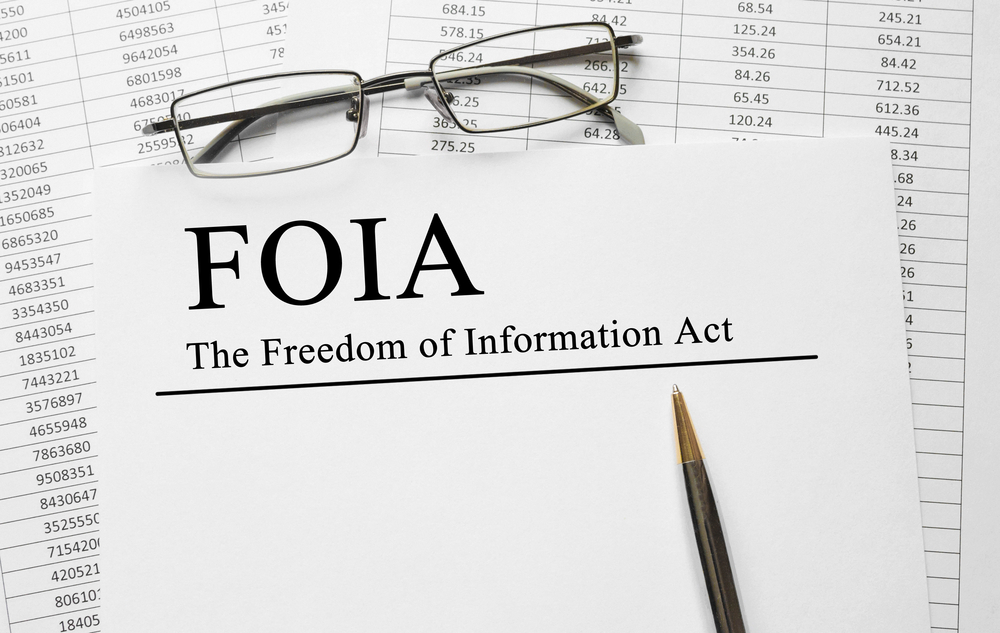In February, three environment-focused nonprofit organizations sued the United States Department of Agriculture for its alleged “purge” of climate change-related data from its department web pages, claiming the action violated various congressional statutes, including the Freedom of Information Act.
The lawsuit was filed in the U.S. District Court for the Southern District of New York on behalf of the organizations by Earthjustice, a nonprofit environmental law group, and the Knight First Amendment Institute.
The complaint alleges the United States Department of Agriculture (USDA) violated the Paperwork Reduction Act by failing to provide notice of the removal of the web pages; the Administrative Procedure Act for the USDA’s alleged failure to acknowledge the possible harm of the removals and therefore didn’t “engage in reasoned decision-making;” and the Freedom of Information Act (FOIA) for allegedly making the records inaccessible and failing to oblige with FOIA’s affirmative disclosure provision.
The directive for the removals was given on Jan. 30, according to the complaint, by USDA Director of Digital Communications, Peter Rhee, who “sent an email ordering USDA staff to ‘identify and archive or unpublish any landing pages focused on climate change.’”
In its response to the lawsuit on March 31, the USDA argued that the organizations’ arguments were not applicable and requested the court deny the motion for a preliminary injunction.
“The Government and the public have a strong interest in allowing an incoming administration to implement its policy priorities and to have public-facing Government webpages reflect those priorities, and that interest substantially outweighs any interests Plaintiffs assert in climate-related content on USDA’s webpages,” the filing states.
But on May 12, the USDA agreed to “restore the climate-change-related web content that was removed post-Inauguration, including all USDA webpages and interactive tools enumerated in Plaintiff’s Complaint.” Despite this letter, various web pages include a disclaimer stating that the “site is under review and content may change.”
First Amendment Watch spoke with Jeffrey Stein, associate attorney at Earthjustice, about the case. Stein discussed the First Amendment implications of the case, outlined the alleged harms experienced by his clients, and the importance of the affirmative disclosure provision under FOIA.
Editor’s note: This interview has been edited and condensed for length and clarity.
FAW: Are there any First Amendment issues that arise from the removal of climate change-related webpages from various U.S. Department of Agriculture (USDA) websites? Is there an affirmative First Amendment right to receive the information in question here, or is the alleged violation all involving violations of congressional statutes?
Stein: We didn’t raise a First Amendment claim, but I think this case still pretty squarely implicates free expression, and maybe more fundamentally, our system of democratic governance. I can situate the case within the broader context of, I think, a disturbing trend of this administration disappearing thousands of government web pages, tools, datasets, or other digital resources. As reflected in our complaint, these purges have had real impacts on our clients. They’ve also had impacts on individuals and organizations far beyond the farming context or the agriculture context. So you may have heard about the Centers for Disease Control and Prevention, scrubbing public health information from its websites [of which a judge ordered the temporary restoration of the deleted web pages]. That purge impacted doctors who rely on that information to provide urgently needed healthcare, including addressing chlamydia outbreaks. Other purges have impacted environmental NGOs who rely on previously available environmental justice related tools so they can advocate on behalf of low income and Black community members who are disproportionately bearing the brunt of water and air pollution in this country. As bad as those harms are in those cases, and as bad as the harms are to our clients in our case, I think that these government information purges, taken as a whole, pose an even deeper threat to our system of democratic governance. I think at bottom, the government’s public information, including its web pages, belong to the people, and democracies like ours simply don’t work if people can’t access information about their government’s policies and its funding decisions, for example. And we can’t cultivate a democratic culture — which I think really requires shared factual premises, deliberation, accountability — if the government refuses to be a responsible steward of the knowledge that we’ve collectively developed as a society. So I think these web page purges cause serious and immediate harm to many groups and individuals, including our clients. I think they also represent a broader attack on American democracy, and certainly the system of free expression and inquiry that is a cornerstone of that system.
FAW: Can you elaborate a bit more on the free expression aspects of the case?
Stein: I would argue that the two concepts — free expression and democratic self-governance — are inextricably intertwined. As you may know, there’s a long line of free expression scholarship, from foundational mid-twentieth century work by Alexander Meiklejohn to more recent essays from Robert Post, that explores the ways in which our system of free expression is, perhaps primarily, intended to foster public discourse, or communication that’s necessary to forming public opinions. If we understand this as a guiding principle about why we have a system of free expression, it can help us understand and adjudicate questions about the First Amendment, including its scope and protections. It can also help clarify the purpose of non-First Amendment laws, including, in my view, the Paperwork Reduction Act and FOIA, which prescribe rules about ensuring access to government information, precisely because such access is often a necessary precondition for the sort of collective decision-making that is the lifeblood of democracy.
Let me give you an example from our case. One of the interactive tools that USDA removed as part of the purge we challenged was the Forest Service’s Climate Risk Viewer, a geospatial interactive mapping tool that has dozens of climate-, environmental-, and biodiversity-related data layers. This tool allows members of the public to see the categories of information that the Forest Service thinks are relevant to its policy decisions, to visualize how those categories of information interact with each other, and to access the raw data that the government uses for each category of information. For instance, members of the public can use the Climate Risk Viewer to generate and explore a map that shows how areas of the country currently protected by the “Roadless Rule” (which limits road construction on over 50 million acres of national forests) overlap with the nation’s mature and old growth forests (which are particularly important to protecting biodiversity and storing carbon). The Trump Administration has said that it will rescind the Roadless Rule and that it aims to vastly increase logging throughout the national forest system. With the Climate Risk Viewer, members of the public — including researchers and advocates — can access and interpret data, including on a very granular level, that will clarify the impacts of the Trump Administration’s policies, and thus enable them to intervene in public discourse about those policies.
I think this example illustrates how access to government information goes hand in hand with the sort of speech that’s necessary in a thriving democracy. And it explains why a familiar play from the playbook of authoritarian governments is to destroy or manipulate government information. These authoritarian regimes realize that they may not need to employ heavy handed censorship rules to effectively deprive people of their freedom to speak—though they may do this too. Rather, they can achieve many of the same goals by simply cutting off access to the information people need to effectively participate in democratic processes.
FAW: The lawsuit states that the removal of these webpages causes irreparable harm to the plaintiffs, three nonprofit environment-focused organizations. What are some specific examples of the alleged harms they’ve endured as a result of the removals?
Stein: About a week and a half into the new administration, USDA ordered its staff to archive or unpublish climate change-focused landing pages across its website, and to identify all USDA web content related to climate change, so they could be reviewed and possibly removed. And within days of that order, we started hearing from partners across the country that dozens of USDA digital resources had been taken down without any notice or any public explanation. This included policy documents about conservation practices that farmers implement to protect their farms from droughts and extreme weather, which is obviously a growing concern given the changing climate. They included guides for helping farmers navigate really byzantine federal loan programs that USDA administers. They included detailed data about the Inflation Reduction Act’s investments and, for example, rural clean energy programs. In some cases, programs that Congress allocated billions of dollars to in order to increase rural communities’ access to clean energy. And speaking more directly to the First Amendment type interests that are at stake in the case, we also described in declarations how the removal of data sets and interactive tools thwarts advocates efforts to engage in fast moving nationally significant public policy debates, including a debate that was raging throughout the spring about the Trump administration’s unlawful funding freezes, as well as really radical policy changes, including to federal logging policy.
FAW: Could the removal of all landing pages as related to “climate change” be considered viewpoint discrimination since it targets a specific subject, climate change, and a viewpoint that climate change exists? Is it an overbroad directive? Does it follow an executive order from President Donald Trump?
Stein: Certainly one justification that the government ultimately provided for the purge, to the extent they provided any justification at all, was that removing these web pages was part of implementing President Trump’s executive orders, including those that relate to climate change. I do know that there’s another case related to public health data and information [Schiff, et al, v. U.S. Office of Personnel Management, et al], brought by the American Civil Liberties Union of Massachusetts, on behalf of a couple of doctors whose scholarly works were previously housed in a government database for public health research. And their research was taken down, and one of the claims in that case was that this constituted First Amendment viewpoint discrimination because the reason for removing this research was that it mentioned, even only just in passing, [the words “LGBTQ” and “transgender”]. I think part of the court’s analysis there, somewhat different from our case, is that the repository of research at issue in that case was a [limited] public forum, triggering First Amendment analysis. But I think even if there aren’t First Amendment claims at issue in the case, our case and others like it are, I would consider, examples of using non-First Amendment law to further some of the values that are at the core of the First Amendment.
I think one way to think about our case, as opposed to the Schiff v. OPM case, is that in our case we’re challenging the removal of the government’s own information. This isn’t a case where the government has censored citizens speech as in the case of removing research that was housed in a public forum because it included certain words. But just because our case just involves the government’s own speech, it doesn’t mean that the government is free to do whatever it wants with its own information. There are legal constraints on its ability to remove public information. And those include the three laws that we cite in the complaint and in our briefs: the Freedom of Information Act, the Paperwork Reduction Act, which requires the government to provide adequate notice to the public before it modifies or terminates significant web pages, and the Administrative Procedure Act, which prohibits the government from essentially engaging in unreasoned decision making, including with respect to its decision to remove web pages.
FAW: The government speech doctrine generally holds that government speech is not subject to First Amendment limitations. Does this fall within this doctrine?
Stein: You’re totally right that modern government speech doctrine is extremely expansive and allows the government to avoid the strictures of the First Amendment in lots of different ways. For this reason, Justice Alito has criticized it as taking “a large and painful bite out of the First Amendment.” There’s also lots of thoughtful scholarship critiquing the doctrine, and I think we are seeing how such an expansive view of government speech can enable the government to control the marketplace of ideas in ways that are at odds with First Amendment values.
But, for better or for worse, this is the current law — which is why we need to search for other ways to defend First Amendment values, in ways that don’t necessarily rely on the First Amendment directly, but rather on other legal constraints on the process or manner in which the government disseminates or discloses information. The claims at issue in our case illustrate this point. The Paperwork Reduction Act, for example, mandates that federal agencies give the public adequate notice before it removes or modifies any significant way of disseminating government information, including webpages and interactive tools, and it also mandates that federal agencies provide “timely and equitable access” to government information, which requires agencies to, among other things, remove technological barriers to accessing its information. FOIA also imposes disclosure obligations on government agencies by, for example, requiring agencies to proactively disclose their policy statements online, and to index those statements so that members of the public can find them.
I think it’s important to note that these constraints do not require the government to adopt a certain message, or even to speak at all. Rather, what they do is impose procedural and substantive requirements once the government has already chosen to generate information. And I think that Congress enacted these constraints because they recognized that they are essential to cultivating the kind of speech environment that will foster and maintain public institutions, and our broader system of democratic governance.
FAW: What is the “affirmative-disclosure” provision of FOIA? How is it important here?
Stein: I think maybe you and many of your readers will mostly be familiar with the Freedom of Information Act as a request-and-respond scheme. One that entitles the public to records that don’t fall within one of FOIA’s enumerated exemptions, so long as they request the record, then an agency is obligated to provide it to that member of the public. But in addition to that request-and-respond scheme, FOIA also has provisions which are colloquially referred to as the “reading room” provisions that mandate affirmative disclosure for certain categories of information, including policy documents. And those provisions require agencies like USDA, in this case, to make certain information proactively available online, and it also requires them to index that information, essentially to make it accessible and ascertainable by members of the public. I think, unfortunately, for many years, and I think there’s some empirical research that substantiates this, the affirmative disclosure provisions of FOIA have been considered something of a backwater and widely ignored by many agencies. And there is a very broad body of FOIA case law about the request-and-respond aspect of FOIA, but there’s been much less judicial engagement with the reading room provisions, and that’s been changing over the course of the past decade or so. Some of these issues, including about the remedy that courts are empowered to issue when there’s been a violation of the reading room provisions, have been percolating up through the courts and so I think that this will be a really important trend for folks who care about transparency, government accountability, and free expression, to pay attention to what content the courts end up giving, ultimately, to these, what I think could be, quite powerful affirmative obligations.
FAW: The government’s May 12 letter stated the pages would be restored. On some USDA pages, it states that as of May 20, the “site is under review and content may change.” Why?
Stein: The parties in the case filed a joint letter with the court saying that USDA had committed to restoring all climate related web pages that it had taken down post inauguration, including those enumerated in our complaint. After that those web pages went live again, but they do have this disclaimer on them. The case is still pending, it hasn’t been finally resolved. And so it remains an open question what the agency precisely means by that disclaimer, and that’s an issue that we’re hoping to resolve in the case.
More on First Amendment Watch:




